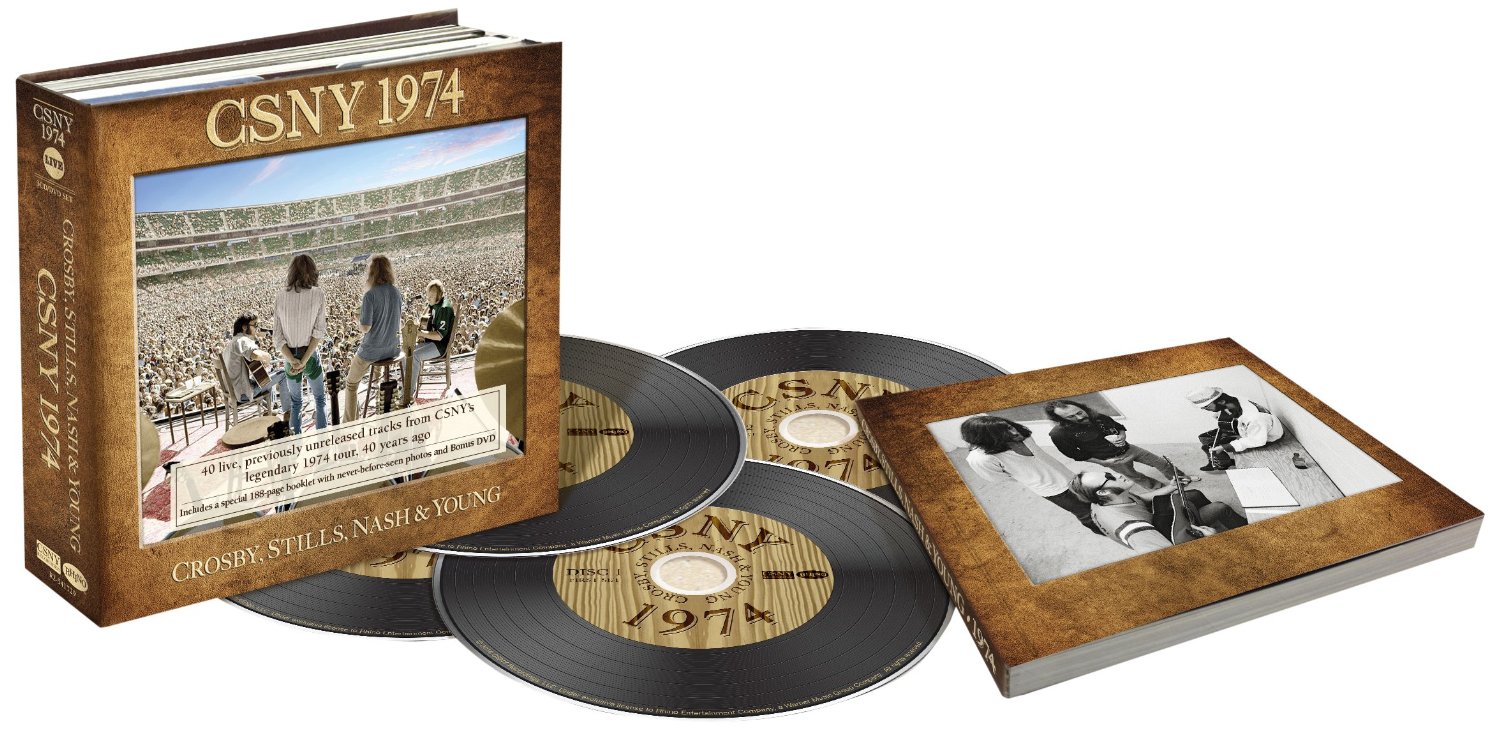
Rhino Records has done it again with this fabulous 3 CD and DVD box set of Crosby, Stills, Nash, and Young’s 1974 concert tour. The 40 songs on these CDs–some never released before–will certainly transport you back to the Seventies. Yes, this is a great nostalgia indulgence, but well worth it. There’s also a single CD available at Wal-Mart in case you don’t want to shell out $54.98 for this deluxe box set. What’s your favorite CSNY song?
TRACK LIST:
Disc: 1
1. Love The One You’re With
2. Wooden Ships
3. Immigration Man
4. Helpless
5. Carry Me
6. Johnny’s Garden
7. Traces
8. Grave Concern
9. On The Beach
10. Black Queen
11. Almost Cut My Hair
Disc: 2
1. Change Partners
2. The Lee Shore
3. Only Love Can Break Your Heart
4. Our House
5. Fieldworker
6. Guinevere
7. Time After Time
8. Prison Song
9. Long May You Run
10. Goodbye Dick
11. Mellow My Mind
12. Old Man
13. Word Game
14. Myth Of Sisyphus
15. Blackbird
16. Love Art Blues
17. Hawaiian Sunrise
18. Teach Your Children
19. Suite: Judy Blue Eyes
Disc: 3
1. Déjà Vu
2. My Angel
3. Pre – Road Downs
4. Don’t Be Denied
5. Revolution Blues
6. Military Madness
7. Long Time Gone
8. Pushed It Over The End
9. Chicago
10. Ohio
Disc: 4
1. DVD: Only Love Can Break Your Heart
2. DVD: Almost Cut My HaiR
3. DVD: Grave Concern
4. DVD: Old Man
5. DVD: Johnny’s Garden
6. DVD: Our House
7. DVD: Déjà Vu
8. DVD: Pushed It Over The End
TROUBLE NO MORE: LIVE AT TOWN HALL July 31, 2003 By John Mellencamp
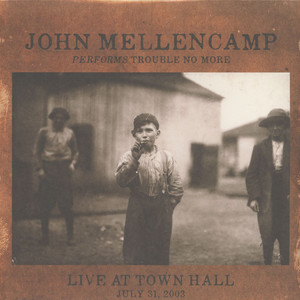
I’m not fond of live albums. Usually, the sound is bad and many musicians outside the recording studio sound worse. There are exceptions. I love Sarah McLachlan’s Mirrorball. And I’m a fan of Loreena McKennitt’s live albums. Jackson Brown’s Running On Empty is a classic. But, they are the exceptions. So factor that in to this review of John Mellencamp’s Trouble No More, a collection of mostly blues and folk songs. The first 10 songs on this CD are songs I will never listen to again. They are just not music I like. Song #11 is “Small Town” which was a hit for Mellencamp. #13 “Teardrops Will Fall” is the best song on the CD. #15 “Pink Houses” is another of Mellencamp’s hits. I might listen to those three songs sometime in the future. But, for me, this CD was a disappointment. GRADE: C-
TRACK LIST:
1 Stones in My Passway (3:17)
2 Death Letter (6:16)
3 To Washington (3:17)
4 Highway 61 Revisited (4:40)
5 Baltimore Oriole (4:03)
6 Joliet Bound (3:30)
7 Down in the Bottom (3:28)
8 Johnny Hart (4:45)
9 Diamond Joe (4:28)
10 John the Revelator (3:28)
11 Small Town (4:16)
12 Lafayette (3:44)
13 Teardrops Will Fall (4:22)
14 Paper in Fire (4:06)
15 Pink Houses (5:42)
LUCY

Scarlet Johansson plays a partying student who inadvertently falls into the clutches of a Taiwan drug gang. They sew a bag of a new synthetic drug into Scarlet’s abdomen so she can smuggle the drugs into Europe. But, the bag leaks. The drug enters Scarlet’s bloodstream and suddenly her brainpower increases by the hour. Scarlet contacts Morgan Freeman (who plays a brain scientist) and arranges a meeting in Paris. But the Taiwan drug gang wants their drugs and they want to kill Scarlet. They head for Paris, too. As you might expect in a movie like Lucy there’s plenty of action and gunplay. But as Scarlet’s brainpower increases her powers, the philosophical questions of what would happen if we could use more than 10% of our brains start to become answered. Lucy is more than an Summer Movie, it will make you think. GRADE: B+
THE MARTIAN WAY By Isaac Asimov
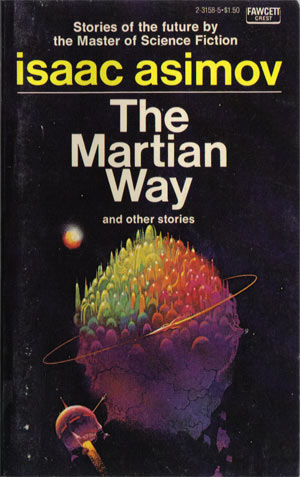
MARS WEEK starts next Monday. This review is just a friendly reminder that a week of books and movies about the Red Planet awaits you on this blog starting seven days from today. When I was a kid, I read The Martian Way. It was published in 1955, but the four stories in this collection were published in science fiction magazines in the early 1950s. The title story, “The Martian Way,” revolves around a political situation where politicians on Earth threaten to cut off water to the Mars colonists. The colonists have to resort to “the Martian Way” to solve the problem. “Youth” has two space explorers whose spaceship has crashed becoming “pets” to the youths who find them. “The Deep” concerns a distant planet whose sun is dimming. The aliens find a way to migrate to Earth, but Asimov provides a twist at the end. “Sucker Bait” is one of Asimov’s best puzzle stories. A planet where a first expedition died shortly after trying to set up a colony is visited by a second expedition. This time, scientists are supposed to determine what caused the catastrophe. One of the members of the crew is a member of the Mnemonic Service. He is able to remember EVERYTHING. And although the other scientists dismiss him, the Mnemonic savant discovers the planet’s deadly secret. Isaac Asimov is best known for his Robot novels and the Foundation trilogy, but Asimov was also a gifted short story writer. GRADE: B+
THE BIG FOUR (PBS)
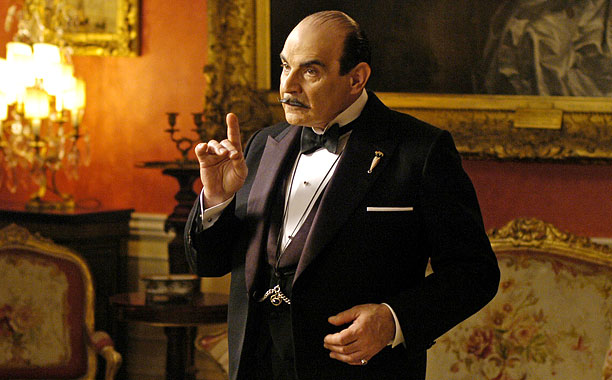
David Suchet is ending his 25+ year stint as Hercule Poirot. PBS MASTERPIECE THEATER is broadcasting The Big Four tonight and Dead Man’s Folly next week. The final three Poirots–Elephants Can Remember beginning August 11,
Labours of Hercules beginning August 18, and Curtain: Poirot’s Last Case on August 25–will be available on Acorn TV. Thereafter all 70 episodes will be available to watch anytime ONLY on Acorn TV. Of course, the entire series can be had on DVD, too. I enjoyed the early Poirots better than the newer ones, but I’ll watch them all. Do you have a favorite Poirot?
BEGIN AGAIN
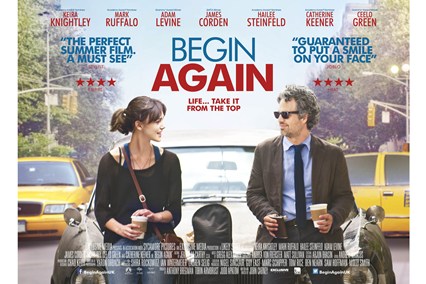
Mark Ruffalo (from Buffalo) plays a washed up record executive. Keira Knightley plays a talented songwriter who has just broken up with her boyfriend (Adam Levine). Ruffalo and Knightley find each other and start their creative journey together. Ruffalo has to repair his marriage to Catherine Keener and his relationship with his troubled teenage daughter played by Hailee Steinfeld. Knightley has to find her voice and make an album of her songs. Ruffalo comes up with the idea of making the album around New York City. There are plenty of great scenes of Knightley and her band playing their songs in classic NYC locales. Director John Carney, who had a hit with Once, strikes gold again with Begin Again. In a summer of disappointing movies, Begin Again is the Real Deal. GRADE: A-
FORGOTTEN BOOKS #278: HORROR: 100 BEST BOOKS Edited by Stephen Jones & Kim Newman

Horror: 100 Best Books was published in 1988. The attraction of the book for me is the commentary on the choices by writers like Stephen King, Dan Simmons, Harlan Ellison, Suzy McKee Charnas, Joe R. Lansdale, and dozens of other authors you’ll instantly recognize. Just check out the Table of Contents below for both the 100 selections but also the writers commenting on the selection. It doesn’t get much better than this. There was a sequel to Horror: 100 Best Books but friends tell me it is far inferior to the original. How many of these horror books have you read?
TABLE OF CONTENTS:
Foreword By Ramsey Campbell
Introduction by Stephen Jones & Kim Newman
1. Clive Barker on Doctor Faustus, by Christopher Marlowe (c. 1604)
2. John Blackburn on The Tragedy of Macbeth, by William Shakespeare (1606)
3. Diana Wynne Jones on The White Devil, by John Webster (1612)
4. Scott Bradfield on Caleb Williams, by William Godwin (1794)
5. Les Daniels on The Monk, by Matthew Gregory Lewis (1796)
6. John Sladek on The Best Tales of Hoffman (1814-1816)
7. David Pirie on Northhanger Abbey, by Jane Austen (1817)
8. John Yolen on Frankenstein, by Mary Wollstonecraft Shelley (1818)
9. Peter Tremayne on Melmoth the Wanderer, by Charles Maturin (1820)
10. Garry Kilworht on The Confessions of a Justified Sinner, by James Hogg (1824)
11. John M. Ford on Tales of Mysery and Imagination, by Edgar Allan Poe (1838)
12. Edgar Allan Poe on Twice-Told Tales, by Nathaniel Hawthorne (1838)
13. Thomas Tessier on The Black Spider, by Jeremias Gotthelf (1842)
14. Thomas M. Disch on The Wandering Jew, by Eugene Sue (1844-1845)
15. Michael McDowell on The Confidence Man, by Herman Melville (1857)
16. M. R. James on Uncle Silas, by J. Sheridan Le Fanu (1864)
17. Jack Williamson on Dr. Jekyll and Mr. Hyde, by Robert Louis Stevenson (1886)
18. Tim Stout on She, by H. Rider Haggard (1887)
19. H. P. Lovecraft on The King in Yellow, by Robert W. Chambers (1895)
20. Gene Wolfe on The Island of Doctor Mareau, by H. G. Wells (1896)
21. Colin Wilson on Dracula, by Bram Stoker (1897)
22. R. Chetwynd-Hayes on The Turn of the Screw, by Henry James (1898)
23. Douglas E. Winter on Heart of Darkness, by Joseph Conrad (1902)
24. Richard Dalby on Jewel of the Seven Stars, by Bram Stoker (1903)
25. Geoff Ryman on Ghost Stories of an Antiquary, by M. R. James (1904)
26. T. E. D. Klein on The House of Souls, by Arthur Machen (1906)
27. Hilaire Belloc on John Silence, by Algernon Blackwood (1908)
28. David Langford on The Man Who Was Thursday, by G. K. Chesterton (1908)
29. Terry Pratchett on The House on the Borderland, by William Hope Hodgson (1908)
30. Milton Subotsky on The Collected Works of Ambrose Bierce (1909)
31. Mike Ashley on Widdershins, by Oliver Onions (1911)
32. Basil Copper on The Horror Horn, by E. F. Benson (1912-1934)
33. George Hay on A Voyage to Arcturus, by David Lindsay (1920)
34. Steve Rasnic Tem on The Trial, by Franz Kafka (1925)
35. Robert E. Howard on Something About Eve, by James Branch Cabell (1929)
36. Karl Edward Wagner on Medusa, by E. H. Visiak (1929)
37. Marvin Kaye on The Werewolf of Paris, by Guy Endore (1933)
38. Jessica Amanda Salmonson on The Last Bouquet, by Marjorie Bowen (1933)
39. Robert Bloch on The Cadaver of Gideon Wyck, by Alexander Laing (1934)
40. Hugh Lamb on A Second Century of Creepy Stories, ed. Hugh Walpole (1937)
41. Lionel Fanthorpe on The Dark Tower, by C. S. Lewis (1938)
42. Denis Etchison on Johnny Got His Gun, by Dalton Trumbo (1939)
43. Donlad A. Wollheim on The Outsider and Others, by H. P. Lovecraft (1939)
44. Harlan Ellison on Out of Space and Time, by Clark Aston Smith (1942)
45. Gerald W. Page on Conjure Wife, by Fritz Leiber (1943)
46. Maxim Jakubowski on Night Has a Thousand Eyes, by Cornell Woolrich (1945)
47. Graham Masterton on The Lurker at the Threshold, by H. P. Lovecraft (1945)
48. Forrest J. Ackerman on Deliver Me from Eva, by Paul Bailey (1946)
49. David G. Hartwell on And Darkness Falls, edited by Boris Karloff (1946)
50. Peter Haining on The Sleeping and the Dead, edited by August Derleth (1947)
51. Robert R. McCammon on Track of the Cat, by Walter van Tilburg Clark (1949)
52. Suzy McKee Charnas on The Sound of His Horn, by Sarban (1952)
53. Joe Haldeman on Lord of the Flies, by William Golding (1954)
54. Richard Christian Matheson on I Am Legend, by Richard Matheson (1954)
55. Joe R. Landsdale on The October Country, by Ray Bradbury
56. Stephen Gallagher on Nine Horrors and a Dream, by Joseph Payne Brennan (1958)
57. Hugh B. Cave on Psycho, by Robert Bloch (1959)
58. Stephen Laws on Quatermass and the Pit, by Nigel Kneale (1959)
59. Michel Parry on Cry Horror!, by H. P. Lovecraft (1959)
60. Lisa Tuttle on The Haunting of Hill House, by Shirley Jackson (1959)
61. Tad Williams on The Three Stigmata of Palmer Eldritch, by Philip K. Dick (1964)
62. Jack Dann on The Painted Bird, by Jerzy Kosinski (1965)
63. Craig Shaw Garner on The Crystal World, by J. G. Ballard (1966)
64. Colin Greenland on Sub Rosa, Robert Aickman (1968)
65. Brian Aldiss on The Green Man, by Kingsley Amis (1969)
66. Neil Gaiman on The Complete Werewolf, by Anthony Boucher (1969)
67. Dan Simmons on Grendel, by John Gardner (1971)
68. F. Paul Wilson on The Exorcist, by William Peter Blatty (1971)
69. John Skipp on The Sheep Look Up, by John Brunner (1972)
70. Frances Garfield on Worse Things Waiting, Manly Wade Wellman (1973)
71. Stephen King on Burnt Offerings, by Robert Marasco (1973)
72. Al Sarrantonio on ‘Salem’s Lot, by Stephen King (1975)
73. Craig Spector on Deathbird Stories, by Harlan Ellison (1975)
74. Brian Lumley on Murgunstrumm and Others, by Hugh B. Cave (1977)
75. Charles L. Grant on Sweetheart, Sweetheart, by Bernard Taylor (1977)
76. David J. Schow on All Heads Turn When the Hunt Goes By, by John Farris 91977)
77. Peter Straub on The Shining, by Stephen King (1977)
78. William F. Nolan on Falling Angel, by William Hjortsberg (1978)
79. Charles de Lint on The Wolfen, by Whitley Strieber (1978)
80. Shaun Hutson on The Totem, by David Morrell (1979)
81. Peter Nicholls on Ghost Story, by Peter Straub (1979)
82. Christopher Evans on The Land of Laughs, by Johnathan Carroll (1980)
83. David S. Garnett on The Cellar, by Richard Laymon (1980)
84. Chet Williamson on Red Dragon, by Thomas Harris (1981)
85. J. N. Williamson on The Keep, by F. Paul Wilson (1981)
86. Samantha Lee on The Dark Country, by Dennis Etchison (1982)
87. Ramsey Campbell on In a Lonely Place, by Karl Edward Wagner (1983)
88. John Clute on The Anubis Gates, by Tim Powers (1983)
89. Brian Stableford on The Arabian Nightmare, Robert Irwin (1983)
90. Malcolm Edwards on The Wasp Factory, by Iain Banks (1984)
91. Thomas F. Monteleone on The Ceremonies, by T. E. D. Klein (1984)
92. Michael Moorcock on Mythago Wood, by Robert Holdstock (1984)
93. Ian Watson on Who Made Stevie Crye?, by Michael Bishop (1984)
94. Edward Bryant on Song of Kali, by Dan Simmons (1985)
95. Adrian Cole on The Damnation Game, by Clive Barker (1985)
96. R. S. Hadji on Hawksmoor, by Peter Ackroyd (1985)
97. Robert Holdstock on A Nest of Nightmares, by Lisa Tuttle (1986)
98. Guy N. Smith on The Pet, by Charles L. Grant (1986)
99. Eddy c. Bertin on Swan Song, by Robert McCammon (1987)
100. Jack Sullivan on Dark Forces, by Ramsey Campbell (1987)
Notes on Contributors
List of Recommended Reading
Acknowledgements
ON THE STEEL BREEZE By Alastair Reynolds

On the Steel Breeze is the second book in Alastair Reynolds’ space opera trilogy, “Poseidon’s Children.” The events of On the Steel Breeze take place 200 years after the events of Blue Remembered Earth, the first book in the trilogy. The ocean-dwelling transhumans of the United Aquatic Nations grow in power while hundreds of “holoships,” basically generational colonizing asteroids, head for new Earth-like planets. In another subplot, Chiku Akinya–who has cloned herself–finds herself the target of an evil artificial intelligence called Arachne. Being the middle book in a trilogy is always awkward. The story needs to progress, but not too much and not spoil the big build-up in the final volume. I flew through On Steel Breeze and now I’m impatient for the third and final volume to wrap all of these complicated plots up! GRADE: B+
THE BRIDGE, SEASON TWO [FX]
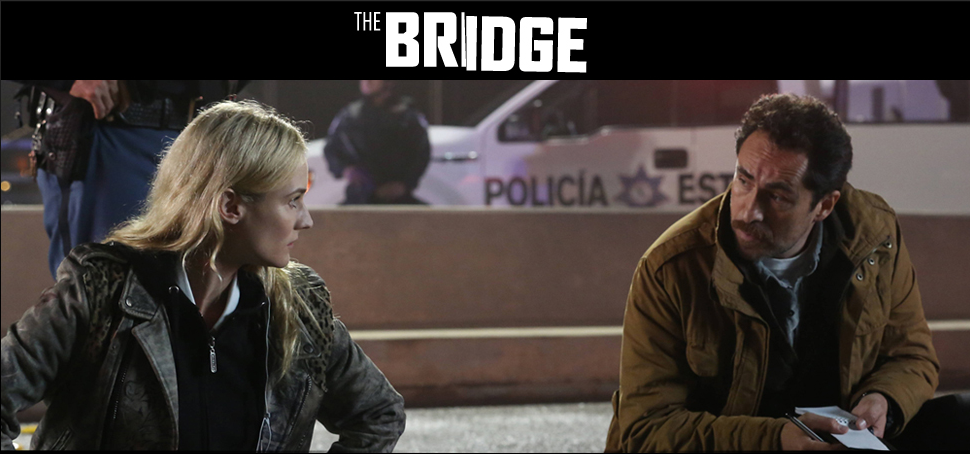
Tonight I’ll be watching the third episode of The Bridge. The Bridge had its Second Season debut a couple weeks ago on FX. I enjoyed the First Season with all of the quirky plots and characters. Mexican actor Demián Bichir returns as the emotional police detective Marco and German actress Diane Kruger reprises her role as the autistic El Paso police detective Sonya. But my favorite character is Matthew Lillard as Daniel Frye, an El Paso Times investigative reporter with a substance abuse problem. Drugs factor into the plots as a common demonstrator of life on the Mexican border. There’s also a serial killer loose, a conspiracy among the corrupt Mexican police to kill Marco, and a hunt for a girl who is living in the U.S. illegally to escape the drug cartels. If you’re looking for high quality drama to fill your Summer, consider The Bridge. You can easily catch up on episodes that are available On Demand.
LIFE ITSELF

Watching this documentary about Roger Ebert was an uncomfortable experience for me. Yes, I laughed at parts of the movie. After all, Roger Ebert was a funny guy. But watching the nurses suctioning out Roger’s air tube was unsettling. Steve James, the director, shows Roger in pain. He shows Roger being “difficult.” Life Itself is as much about Roger’s wife Chaz as it is about Roger. You can see Chaz’s strength empowering Roger. But Steve James also shows the exasperation that all care givers experience when their loved ones are resistant. This is an honest and revealing movie, just what Roger wanted when he started this project. Life Itself moved me, saddened me, and inspired me. It’s a great documentary. I expect Life Itself to win an Oscar next year. GRADE: A